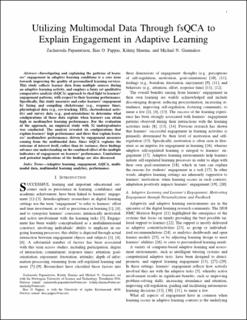| dc.contributor.author | Papamitsiou, Zacharoula | |
| dc.contributor.author | Pappas, Ilias | |
| dc.contributor.author | Sharma, Kshitij | |
| dc.contributor.author | Giannakos, Michail | |
| dc.date.accessioned | 2021-01-26T09:41:33Z | |
| dc.date.available | 2021-01-26T09:41:33Z | |
| dc.date.created | 2020-09-06T19:02:35Z | |
| dc.date.issued | 2020 | |
| dc.identifier.citation | IEEE Transactions on Learning Technologies. 2020, . | en_US |
| dc.identifier.issn | 1939-1382 | |
| dc.identifier.uri | https://hdl.handle.net/11250/2724721 | |
| dc.description.abstract | Investigating and explaining the patterns of learners’ engagement in adaptive learning conditions is a core issue towards improving the quality of personalized learning services. This article collects learner data from multiple sources during an adaptive learning activity, and employs a fuzzy set qualitative comparative analysis (fsQCA) approach to shed light to learners’ engagement patterns, with respect to their learning performance. Specifically, this article measures and codes learners’ engagement by fusing and compiling clickstreams (e.g., response time), physiological data (e.g., eye-tracking, electroencephalography, electrodermal activity), and survey data (e.g., goal-orientation) to determine what configurations of those data explain when learners can attain high or medium/low learning performance. For the evaluation of the approach, an empirical study with 32 undergraduates was conducted. The analysis revealed six configurations that explain learners’ high performance and three that explain learners’ medium/low performance, driven by engagement measures coming from the multimodal data. Since fsQCA explains the outcome of interest itself, rather than its variance, these findings advance our understanding on the combined effect of the multiple indicators of engagement on learners’ performance. Limitations and potential implications of the findings are also discussed. | en_US |
| dc.language.iso | eng | en_US |
| dc.publisher | Institute of Electrical and Electronics Engineers (IEEE) | en_US |
| dc.title | Utilizing Multimodal Data Through fsQCA to Explain Engagement in Adaptive Learning | en_US |
| dc.type | Peer reviewed | en_US |
| dc.type | Journal article | en_US |
| dc.description.version | acceptedVersion | en_US |
| dc.source.pagenumber | 14 | en_US |
| dc.source.journal | IEEE Transactions on Learning Technologies | en_US |
| dc.identifier.doi | 10.1109/TLT.2020.3020499 | |
| dc.identifier.cristin | 1827582 | |
| dc.description.localcode | © 2020 IEEE. Personal use of this material is permitted. Permission from IEEE must be obtained for all other uses, in any current or future media, including reprinting/republishing this material for advertising or promotional purposes, creating new collective works, for resale or redistribution to servers or lists, or reuse of any copyrighted component of this work in other works. | en_US |
| cristin.ispublished | true | |
| cristin.fulltext | postprint | |
| cristin.qualitycode | 1 | |
